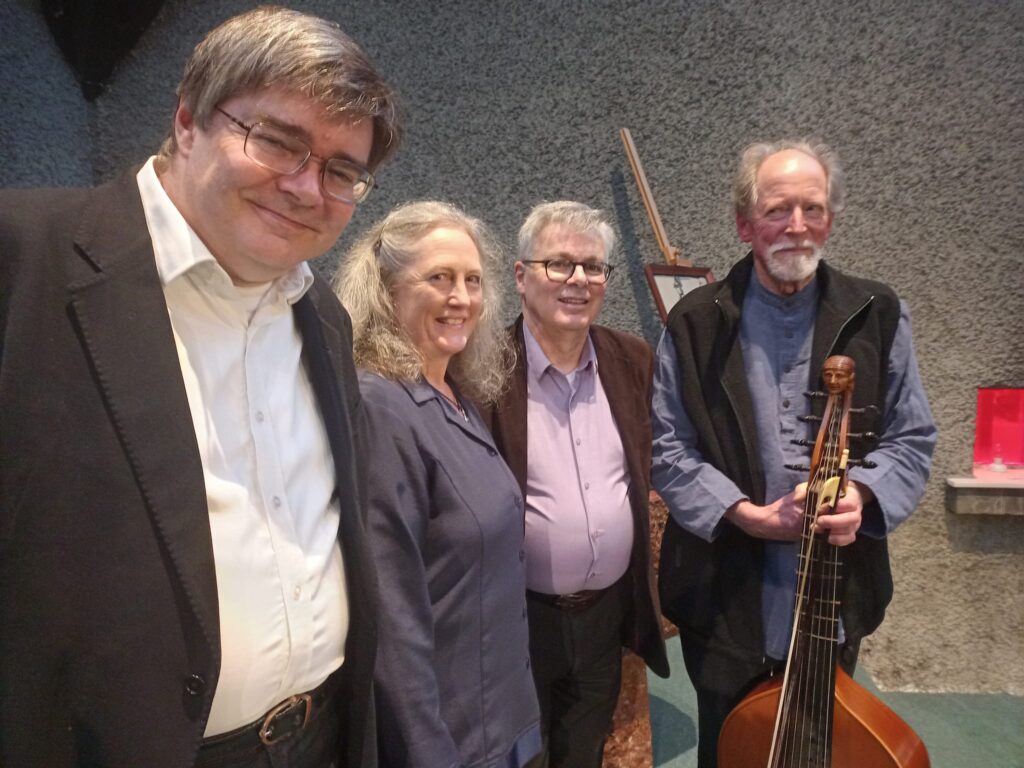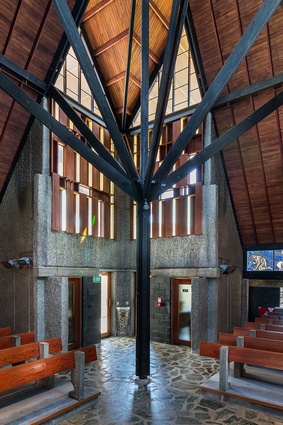Baroque Voices at Futuna Chapel, Karori, Wellington,
June 2024 David Morriss (bass), Pepe Becker (director, soprano), Douglas Mews (keyboards), Robert Oliver (bass viol)
David Morriss (bass), Pepe Becker (director, soprano), Douglas Mews (keyboards), Robert Oliver (bass viol)
 Futuna Chapel, Karori
Futuna Chapel, Karori
Baroque Voices presents “The Choicest Songs”
A presentation celebrating the 30th anniversary of Baroque Voices
and commemorating various other anniversaries pertaining to Futuna Chapel and its creation
Music by John Dowland and his contemporaries
also Henry Purcell, Monica Verburg and Pepe Becker
Baroque Voices – Pepe Becker (soprano), David Morriss (bass)
Douglas Mews (virginals and recorder), Robert Oliver (bass viol)
Futuna Chapel, Friend St., Karori, Wellington
A review by Peter Mechen (Middle C)
On a still and sunny day, Futuna Chapel (built in 1961) in Karori exudes a unique interior atmosphere wrought by the play of light through angularly-placed stained-glass windows contrasting with rather more secluded interior vistas. It’s a singular version of a kind of eternity, one vaster than the actual limited spaces might give one to suggest, but compensating with the mystery wrought by the contrasts. It’s no longer a consecrated chapel, as was the case when I first arrived there as a wide-eyed student from a Palmerston North Catholic school in the 1960s, making one of two separate live-in spiritual retreats here, and relishing on each occasion what used to be (alas, no longer) a surrounding hinterland of native bush through which one could walk and contemplate what seemed like a natural extension of the intangible mysteries I and my classmates were steeped in at that age. (I freely admit it wasn’t entirely a haven of concentrated spiritual refurbishment, as we fifteen year-old boys seemed to all too readily find clandestine ways to entertain ourselves in more worldly pastimes thru games of cards and dice in more secluded parts of that magnificent stand of bush!).
Today, however, was dull and overcast in Karori, as it was elsewhere in Wellington, with the chapel interior having all the more austere and gloomy an atmosphere for our promised concert, organised by the indefatigable Pepe Becker, the “guiding Light” behind the Wellington group “Baroque Voices”, whose 3O-year performing anniversary fell this month. Fortunately the bustle and atmosphere created by an enthusiastic (and practically full-house) audience created an ambience of its own which even the “ticky-tacky suburbia” that has ravaged the once-verdant surroundings couldn’t entirely spoil once we were inside and registering the chapel interior’s still-stunning evocations of its own kind of spirituality.
Pepe Becker’s programme notes reminded us that today’s concert was an occasion of anniversaries, being the 100th birthday of Futuna Chapel’s architect John Scott, who died in 1992 at the age of 68. And, coincidentally, it was the first anniversary of another important creative artist, Jim Allen, four of whose sculptures are embedded in the chapel’s architectural fabric. These anniversaries prompted the Futuna Chapel Trust to commission from Pepe Becker a new work commemorating both architect and artist, one called “concrete, wood and light” and to be performed at today’s concert.
But there were premieres aplenty today, with two others featuring songs Pepe had written dedicated to two of her performing colleagues, bass David Morriss and the viol player Robert Oliver. First, we heard a song called “Fog”, with words written by the poet Carl Sandburg, and secondly an “Ave Maria” setting , one with an extra dedication to Pepe’s former mother-in-law, Mary Becker, who died in 2022. These songs all included the overall title “Capricorn”, alluding to the star-sign all of the people involved (including the poet!). Adding further distinction to the concert were two more premieres by a different composer, a pair of songs called “Reflections”, with both words and music written by a flute-player friend of Pepe’s, Monica Verburg, interested in the combination of voice and recorder. Pepe remarked upon the pleasure of performing so many of these songs in close association with the people they were dedicated to.
Besides all of this there were works whose sounds, sentiments and spirit expressed a defining aspect of Baroque Voices’ raison d’etre, songs variously by John Dowland and Henry Purcell rubbing shoulders with a couple of instrumental performances featuring music by lesser-known contemporaries, Tobias Hume (1579-1645) and a name I didn’t know, William Inglot (1553-1621). Though one often encounters the quote “Semper Dowland, semper dolens” from the composer’s own title for one of his consort pieces, not all of his music is steeped in melancholy, as the concert’s opening number demonstrated – Up merry mates, from Dowland’s last book of songs the 1612 A Pilgrimes Solace, was presented here as a lively dialogue song between a ship’s master (Pepe) and his crew (David) on the occasion of rough weather, one which contains a philosophical response to the whims of nature (and some extremely low notes which David Morriss did well to negotiate!). The following heartfelt Toss not my soul was, by comparison, more characteristically sombre, beautifully voiced by the singers and sensitively accompanied.
We then got two delightfully contrasting instrumental solos from Robert Oliver featuring the relatively unknown Tobia Hume’s music – firstly Adieu Sweet Love from the composer’s 1605 book The First Part of Ayres, and then the livelier The spirit of Gambo; then it was back to Dowland again, for an attractive, open-hearted Sleep, wayward thoughts, again expressing a mood somewhat removed from the melancholic character usually accorded his work. I do recall my mother, who was a music teacher, being extremely fond of some of the composer’s Lute Dances which had been transcribed for piano, a number of which were anything but melancholic (the cheerful My Lady Hunsdon’s Puffe being one that particularly sticks in the memory).\
Next were three Purcell songs, each demonstrating the composer’s gift for expressing the actual “energy” of words, the first song Come, let us leave the town from “The Faerie Queen” replete with lively, oft-repeated canonic “comes” and other persuasively impressive urgencies from the two singers, all in stark contrast to the following Lost is my Quiet, a soulful lament for what each singer describes as “life’s happiest part”, though we were given a semblance of contentment by the rather more lively While bolts and bars my days control, a song describing the mind as unfettered and “freeborn” though the body be held in captivity.
Came the first of the “Capricorn” premieres, with Pepe Becker’s “Fog” leading the way, Sandburg’s text brief and unprepossessing, characterising the fog as a cat-like in its movements and aspect, David Morriss’s voice suitably dark and restrained, and Robert Oliver’s viol-playing spare and stark as befitted the scenario. This was followed by Monica Verburg’s “Two Reflections” for soprano and recorder, written earlier this year, the first “Turn your eyes” imploring the listener with stepwise figurations to “follow a path that’s good and true”, and with the final words “see the beauty all around” reminding one of Mahler’s use of Chinese poetry in part of his “Das Lied Von der Erde”.
The second song “Ocean breeze” had a more meandering kind of opening, one whose phrasings took up a gentle kind of siciliana rhythm, Pepe’s voice and Douglas Mews’ recorder-playing beautifully delineating their own courseways through scenarios lit up by the setting sun and framed by oceanic surgings. I remember at one point the text “ocean breezes come by with the promise of a new day” coincided with a gust of wind outside the chapel which we all heard make its presence felt!
The last of the three Capricorn settings was an “Ave Maria” written by Pepe last year (2023) but only now receiving its premiere performance – set for soprano, bass and bass viol, and dedicated to both David and Robert, the work was written also for Pepe’s “lovely former mother-in-law”, Mary Becker, and was performed today in her memory. The opening of the work had a kind of prayerful, reverential beginning, with a second part that became more interactive between the voices and more imploring via some beautiful ascending phrases, before concluding with repeated “Amens”.
More songs, firstly from Purcell and finally, Dowland – the two Purcell songs brought out some truly satisfying singing from both voices, firstly, we enjoyed Leave these useless arts in loving, the nimbleness of both voices a real delight, and then the absolutely delicious Come let us agree, from the composer’s “Timon of Athens”, the words containing sentiments than no-one present would have dreamed of disputing! – and especially in the wake of this performance!
The return of Dowland for the last three items in the “song” bracket brought a beautiful solemnity to the first of these, Flow my tears, a song that contained the words “Where night’s blackbird her sad infamy sings”, and featured a virginals-only accompaniment (I read somewhere that this became Dowland’s single most famous song, a kind of “signature-tune” – certainly, on the strength of this stirring performance one could understand why!).
At this point we were treated to the second of our instrument-only interludes, this one courtesy of Douglas Mews at the virginals, and featuring a work by another lesser-known composer, one William Inglott (c.1553-1621). Although obscure today, Inglott carved out a sufficient reputation for himself in his lifetime to have a plaque at Norwich Cathedral erected at his death (and after being restored in the 18th Century, one which survives to this present day). Douglas Mews read a poem on which Inglott’s composition, The Leaves Bee Greene, was based – one which I haven’t been able to locate for this review, unfortunately, but was still eminently worth hearing.
Of the two remaining Dowland songs, the first, the renowned Fine knacks for Ladies again most delightfully gave the lie to the idea of the composer being “semper dolens”, the words tripping over the tongues and from the mouths of both singers, and mellifluously accompanied not only by the bass viol, but additionally by Douglas Mews’ recorder in the second and third verses. After this the last of the songs was always going to sound relatively subdued, but perhaps not inappropriately – words and music of Now, O now I needs must part took on a strong hymn-like character as the singers and instrumentalists (from Verse Three onwards Robert Oliver’s bass viol was joined by Douglas Mews’ recorder once again) gave the sentiments all due sonorous and characterful strength up to the end – very beautiful and heart-warming!
So to the concert’s final item, another premiere, this time a joint commemorative tribute from composer Pepe Becker and poet/writer Gregory O’Brien (whose words had already been written for an earlier publication, and were now set to Pepe’s music for this occasion) to the work of architect John Scott and sculptor Jim Allen. This work, called “Concrete, Wood and Light” was crafted for what the composer called “an aptly unconventional” Quartet of soprano, recorder, bass and bass viol, with additional wood, stone and body-percussion added to the mix – what Pepe called a “sonic homage” to the building’s many colours and textures.
Begun by vocal humming and various kinds of other vocalisings, singers and instrumentalists began intoning the text, along with ambient irruptions of various percussion sounds, and the recorder joining in with the voices. The work reached a focal point at the words “You are a shelter or clearing in which we find our voices”, continuing towards the text’s final reference to “the L-shaped silence of your body”. The rest was resonance and presence and awareness, and with a great oneness at the end – all that seemed to matter was the space itself and the renewed and reaffirmed life into which the artists, performers and audience had poured themselves today.
\